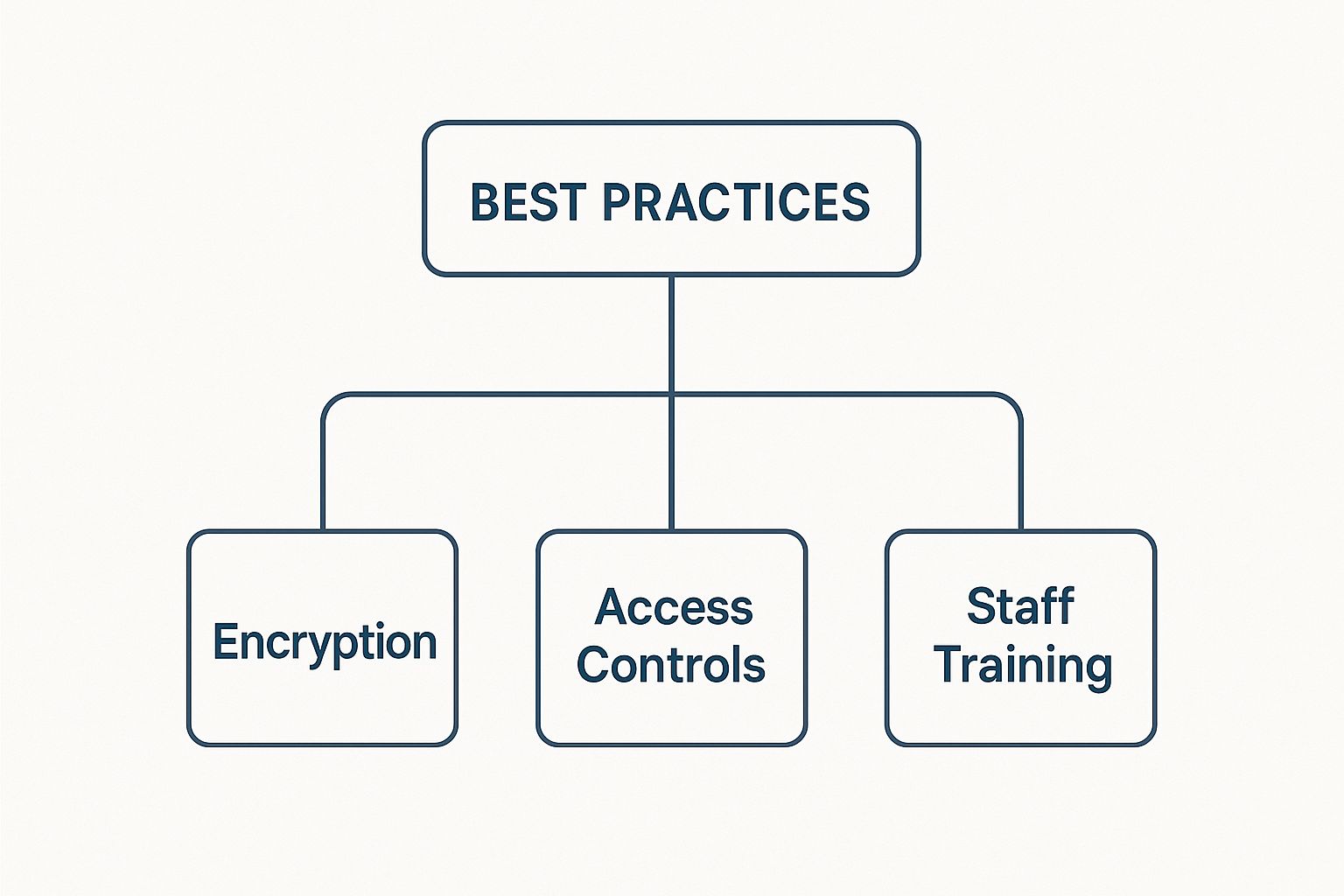Data Security for Law Firms: Protect Client Info & Stay Competitive
Why Cybercriminals Are Obsessed With Your Law Firm
Imagine your firm's data as a treasure chest. Inside are not gold doubloons, but something even more valuable in today’s world: client secrets, financial records, and sensitive case details. While you’re busy advocating for your clients, cybercriminals are casing the joint, looking for weaknesses in your digital defenses. This isn't a hypothetical scenario—it's the daily reality for law firms across the globe. Let's delve into why legal practices are such attractive targets for these digital thieves.
The Allure of Legal Data: A High-Value Target
Law firms handle a veritable gold mine of sensitive information. Think confidential client communications, financial records, trade secrets, intellectual property – the list goes on. For a cybercriminal, this data is far more lucrative than simple credit card numbers. Imagine the potential payoff from pilfering merger and acquisition documents, worth millions on the black market. Or the damage caused by stolen identities used for fraud. Leaked attorney-client privileged communications can even have major political or economic consequences. These high stakes make law firms a prime target.
Evolving Tactics: Beyond the Simple Phish
Forget the easily spotted phishing emails of yesteryear. Cybercriminals have upped their game with sophisticated tactics like spear-phishing. These attacks are personalized to individuals within the firm, often referencing real colleagues or projects, making them incredibly deceptive. Then there’s ransomware, which encrypts vital files and holds them hostage until a ransom is paid, effectively crippling a firm’s operations. And don't forget about third-party vendors. Cybercriminals often target these partners, who may have weaker security, as a backdoor into your systems. For more on security best practices, take a look at this guide: Read also: Data Security Best Practices.
A False Sense of Security: Why Basic Defenses Aren’t Enough
Many law firms believe basic antivirus software and firewalls provide adequate protection. It's like locking your front door but leaving all the windows open. These basic measures are just the first line of defense. Cybercriminals are constantly evolving their tactics, easily bypassing traditional security measures. This creates a dangerous false sense of security, leaving firms vulnerable to more advanced attacks. The legal industry is facing a growing cyber threat. Recent surveys show that up to 40% of law firms have experienced a security breach in recent years, underscoring the gravity of the situation. Discover more insights. Many law firms fall into the small business category, a frequent target for cyberattacks. Learn more about relevant protections in this guide on cyber security insurance for small business.
To bolster your defenses, you first need to understand how cybercriminals operate. It's not about being paranoid; it's about being prepared. By acknowledging your vulnerabilities and investing in robust security measures, you can safeguard your clients, your reputation, and the future of your firm.
Let's take a closer look at the typical attack vectors targeting law firms. The following table breaks down the most frequent methods used by cybercriminals and their potential impact.
Common Attack Vectors Targeting Law Firms
| Attack Type | Frequency | Typical Impact | Prevention Difficulty |
|---|---|---|---|
| Phishing | High | Data breaches, malware infections | Moderate |
| Spear-phishing | Medium | Loss of sensitive data, financial fraud | High |
| Ransomware | Medium | Disruption of operations, financial loss | High |
| Malware | High | Data theft, system damage | Moderate |
| Denial-of-service (DoS) | Low | Disruption of website and online services | Medium |
As you can see, phishing and malware attacks remain common, but spear-phishing and ransomware pose significant threats due to their potential for severe damage and the difficulty in preventing them. Understanding these attack vectors is crucial for developing a comprehensive security strategy.
What Makes Your Client Files Digital Gold

This screenshot from Wikipedia's Data Breach page paints a stark picture: breaches happen, and they happen across all industries. The sheer number of incidents listed serves as a wake-up call to law firms. Why? Because the information you hold is a prime target.
Think about it. A single law firm breach can make headlines for weeks. That's because the data you manage isn't just ones and zeros—it’s valuable, sensitive information. Merger documents worth millions, personal details that could ruin lives, intellectual property coveted by competitors, and confidential attorney-client communications—all live within your systems.
The Dark Web Marketplace: Where Your Data Finds Buyers
Imagine a digital auction house, hidden in the shadows of the dark web. Here, stolen data is the currency, and legal information, due to its confidential nature, is a high-ticket item. Merger and acquisition documents can go for hundreds of thousands of dollars. Personal data, like social security numbers and bank account details, are sold piecemeal, fueling identity theft. Cybercriminals use sophisticated methods like phishing to target law firms. Reviewing phishing email examples can help you recognize and avoid these threats.
Why Certain Practice Areas Shine Brighter
Some practice areas are particularly enticing for bad actors. Firms specializing in intellectual property, for example, are a goldmine for competitors seeking an unfair advantage. Similarly, firms involved in high-profile litigation hold sensitive data that could be used for insider trading or to manipulate legal proceedings.
Unique Vulnerabilities in the Legal World
The very nature of legal work creates unique security challenges. Think about the frequent need to share documents with external parties, like opposing counsel or expert witnesses. This necessary collaboration increases the risk of breaches. Then there's email—the workhorse of legal communication. Often used for sensitive information without proper encryption, email exposes firms to interception. Finally, the fast-paced, high-pressure world of law can lead to overlooked security protocols in the rush to meet deadlines. All of this makes a strong data security strategy not just important, but essential.
Making Compliance Work For You, Not Against You
Stop fearing compliance and start viewing it as an advantage. Smart law firms realize that regulations aren't obstacles; they're more like detailed blueprints guiding their security investments. This section clarifies the sometimes confusing world of regulations affecting legal practices, from the various state bar requirements to essential federal privacy laws.

This infographic shows the fundamental best practices for data security in law firms—encryption, access controls, and staff training. It emphasizes how these three core elements are the foundation of a solid data security strategy.
Decoding the Regulatory Maze
Navigating data security regulations can feel overwhelming. State bar regulations can vary significantly depending on where you practice. Federal laws like HIPAA, which deals with protected health information, can make or break your practice. Also, new regulations are constantly being introduced, like the SHIELD Act in New York, which has stricter rules about data breach notifications. For a deeper dive, check out our article on data privacy compliance. Staying on top of these changing requirements is difficult, even for seasoned legal professionals.
From Cost Center to Client Magnet
Instead of seeing compliance as a financial burden, think of it as a way to grow your business. Firms with excellent data security attract clients who value confidentiality. Imagine this: would you trust your sensitive legal issues to a firm with weak security? Probably not. By showcasing your dedication to compliance, you build trust and stand out from the competition. Some firms even charge more because of their robust security.
To give you a better idea of the specific regulations that might affect your practice, take a look at the table below:
Key Compliance Requirements by Practice Area
Specific data security regulations and requirements that apply to different legal specialties
| Practice Area | Primary Regulations | Key Requirements | Penalties for Non-Compliance |
|---|---|---|---|
| Healthcare | HIPAA, HITECH Act | Encryption of PHI, breach notification protocols | Fines, corrective action plans, reputational damage |
| Finance | GLBA, PCI DSS | Data encryption, access controls, regular audits | Fines, license revocation, legal action |
| Intellectual Property | State Bar Regulations, GDPR (if applicable) | Confidentiality agreements, secure data storage | Loss of clients, legal action, reputational damage |
| Family Law | State Bar Regulations, confidentiality rules | Secure storage of sensitive personal information | Disciplinary action by the Bar, legal action |
This table shows how the specific regulations and penalties can differ greatly based on the type of law you practice. Understanding these differences is crucial for building an effective compliance program.
Practical Frameworks for Staying Ahead
You don't need a team of expensive consultants to build a robust compliance program. Start with a detailed data security policy that lays out clear procedures. Train your staff regularly on best practices, focusing on real-world examples and current threats. Conduct regular security audits to find and fix vulnerabilities. These steps not only strengthen your security, but they also show clients that you're proactive.
Communicating Your Security Advantage
Just being compliant isn't enough—you need to tell people about it! Feature certifications like ISO 27001 in your marketing materials. Include information about your security measures in client proposals. Show how your investment in data security demonstrates your commitment to keeping client information confidential. By making compliance a visible strength, you build client confidence and gain a competitive edge. This proactive strategy transforms data security from a necessary cost into a real business advantage.
Security Technology That Actually Protects Law Firms

We've talked about why law firms are such attractive targets for cybercriminals and the high value of the data they possess. Now, let's explore the tools that can truly safeguard that data. Choosing the right security tech can feel overwhelming, but it doesn't have to be. It's not about buying the most expensive product, but about building a practical, multi-layered defense.
Encryption: Your Last Line of Defense
Think of encryption as putting your sensitive data in a digital safe. Even if someone breaks through your outer defenses, the encrypted data remains scrambled and useless without the decryption key. It's like a combination lock – stealing the chest doesn't help if you don't know the code.
Military-grade encryption, such as the Advanced Encryption Standard (AES-256), is a great example. With current technology, it's virtually unbreakable, ensuring that even in a worst-case scenario, client confidentiality remains intact.
Access Controls: Who Sees What?
Access controls are like the internal locks within your firm. They determine who gets access to which specific files and information. This isn't just about a general lock on the front door; it's about giving each person a key only to the rooms they need to be in.
The principle of least privilege is key here. This means each user only has access to the information they absolutely need for their job. This limits the potential damage from a single compromised account. A paralegal doesn't need access to financial records, and a receptionist doesn't need access to case files. This granular approach is essential for robust data security. You might be interested in: Check out our guide on: Security Control Framework.
Intrusion Detection and Prevention: The Watchdogs
Imagine having digital watchdogs constantly patrolling your network, looking for anything suspicious. That's what intrusion detection systems (IDS) and intrusion prevention systems (IPS) do.
An IDS is like a security camera: it alerts you to suspicious activity. An IPS is more like a security guard: it actively blocks the threat. These systems work together to give you real-time defense against malware and other cyberattacks.
Backup and Recovery: Your Safety Net
Regular backups are your safety net in the digital world. Imagine a fire destroying your physical office. What's the most important thing to save? Your client files, of course! Data is no different.
Regular backups to a secure, offsite location ensure that if data is lost or corrupted (due to a ransomware attack, natural disaster, or anything else), you can restore it quickly, minimizing downtime and preventing catastrophic data loss.
The AI Advantage: Smart Security
Technology, including AI, is changing how law firms handle data security and client service. In fact, 54% of legal professionals use AI to draft correspondence, and 47% use it to analyze firm data and matters, showing a growing reliance on technology. Discover more insights. AI-powered threat detection analyzes network behavior to identify anomalies that traditional systems might miss. It's like having a detective who learns your firm's normal activity and flags anything unusual. AI can also automate time-consuming security tasks, freeing up your IT team to focus on bigger-picture strategies. Combining these technologies allows firms to build strong, layered defenses that adapt to the ever-changing threats they face. It's about working smarter, not harder, to empower your team to operate efficiently and securely. By building these layers, you strengthen your firm's data security, which is paramount to success.
Building Security Culture Your Team Actually Embraces
Let's be honest: the strongest data security measures for law firms are useless if your team doesn't use them correctly. Think of building a strong security culture like instilling good habits. It requires the right approach, consistent reinforcement, and making security a natural part of the workday, not an extra chore.
Winning Over the Skeptics
Some partners might view security as solely "IT's problem." However, the impact of data breaches extends far beyond the IT department. Everyone is affected. Explain to partners how robust security protects client trust, safeguards the firm’s reputation, and ultimately, benefits their bottom line. Sharing real-world examples of breaches impacting similar firms can make the issue more tangible. Focus on the personal consequences, not just the technical details.
It's about shifting the perspective from a technical issue to a business imperative.
Training That Sticks
Busy legal professionals don't have time for dull, generic security training. Make it engaging and relevant. Use real-world scenarios that resonate with their daily work, incorporating interactive exercises and even gamification to maintain interest. Microlearning, delivering training in short, focused bursts, can be far more effective than long, drawn-out sessions. Consider cloud-based security solutions like QuickBooks Cloud Hosting Security when choosing your tech stack. This approach can offer additional layers of protection and flexibility.
Think bite-sized learning for maximum impact.
Awareness Without the "Police State"
Security shouldn't feel like an oppressive Big Brother. Instead, encourage open communication about security concerns. Foster a culture where people feel comfortable reporting suspicious emails or potential vulnerabilities without fear of repercussions. Celebrating security successes, both big and small, reinforces positive behavior and creates a sense of shared responsibility.
It's about building trust, not creating fear.
Empowering Security Champions
Instead of having a team that begrudgingly follows rules, aim to transform them into proactive security advocates. Share success stories of firms that improved their security by focusing on their people. Discuss how to address resistance to new security protocols, acknowledging that change can be challenging. Explore incentive programs that authentically reward secure practices, motivating the team from within. For more on this, check out our article about maintaining client confidentiality.
Turn your team into active participants, not passive observers.
Leading by Example
This image illustrates the key pillars of security awareness: promoting awareness, teaching behavior, and shifting culture. It demonstrates how these elements are interconnected, highlighting that true security awareness goes beyond simply providing information. It requires a fundamental change in the firm's culture.
A strong security culture starts at the top. When partners and leadership visibly prioritize security, it sets the standard for the entire firm. Empowering your team to become security champions, rather than just compliant employees, strengthens your firm’s security from the inside out. It's not simply about implementing new tools; it's about fostering a culture of shared responsibility, where everyone understands their role in protecting the firm and its clients. This approach transforms security into a strategic advantage that contributes to overall success.
When Security Fails: Your Crisis Management Playbook

Even with the best data security measures in place, incidents can still occur in a law firm. The difference between a manageable setback and a full-blown reputational disaster often hinges on your response. Imagine it like a medical emergency: you need the right procedures, trained staff, and clear decision-making under pressure. This section guides you through creating a response plan specifically for legal practices.
From Panic to Professionalism: Building Your Incident Response Plan
An Incident Response Plan (IRP) is your roadmap through a security crisis. Think of it as your guidebook, leading you step by step from the first sign of trouble to reporting the incident to the appropriate authorities. This plan isn't meant to sit on a shelf gathering dust; it’s a living document, regularly reviewed and updated as needed.
Here are the essentials to include:
- Breach Detection: How will you first become aware of a breach? This might involve automated alerts from your security software or reports from your team.
- Containment: If a breach occurs, how will you prevent it from spreading? This might mean isolating affected computer systems or temporarily disabling user accounts.
- Evidence Preservation: Gathering and preserving evidence is critical for any investigations or legal action. Your IRP should detail the correct procedures for this sensitive process.
- Client Notification: When and how will you inform affected clients? Regulations like the SHIELD Act in New York have specific requirements.
- Regulatory Reporting: Which regulatory bodies need to be informed, and what information do they require? Your IRP should outline these reporting obligations.
- Recovery: How will you restore your systems and data after a breach? This involves having robust backup and recovery procedures in place.
Learning From Experience: Success Stories and Legal Obligations
Understanding your legal and ethical duties during a breach is paramount. The American Bar Association (ABA) emphasizes the duty to safeguard client data. For instance, ABA Rule 1.6 underscores the importance of "reasonable efforts" to prevent unauthorized access to client information. You might be interested in: Learn more in our article about: How to Conduct a Risk Assessment. Furthermore, state-specific regulations, such as the SHIELD Act, outline additional legal responsibilities.
Studying how other firms have successfully navigated incidents can offer valuable lessons. Some firms have emerged from significant breaches even stronger, having improved their security and deepened client trust through open communication.
Communication: Maintaining Trust During Crisis
Communication is essential during a security incident. Open and honest communication with clients can actually fortify your relationships by demonstrating your commitment to their well-being. Explain clearly what happened, the steps you are taking to address the problem, and the measures you’re putting in place to prevent future incidents.
Consider these key communication strategies:
- Proactive Updates: Keep clients in the loop, even if the investigation is still underway.
- Empathy and Understanding: Acknowledge the impact of the breach on your clients and show them that you are committed to resolving the situation.
- Clear Action Plan: Outline the concrete steps you are taking to fix the breach and enhance your security measures.
- Accessibility: Make it easy for clients to reach you with questions or concerns.
By transforming incident response into a well-defined process, you protect your firm's reputation and demonstrate your unwavering commitment to client confidentiality. This proactive approach changes a potential catastrophe into a chance to strengthen relationships and improve your overall data security. It assures clients that you’re not only prepared for the worst, but you’re also equipped to handle it professionally and efficiently.
Turning Security Investment Into Business Growth
Forward-thinking law firms understand a crucial truth: robust data security isn't just a cost—it's a powerful business advantage. It's about attracting and retaining clients, securing better rates, and setting your practice apart in a competitive legal field. Smart firms are turning security investments into a key driver of growth.
Client Confidence: Security as a Deciding Factor
Clients are increasingly aware of data security risks. They're actively looking for legal counsel that prioritizes the confidentiality of their sensitive information. Imagine you're dealing with a complex legal matter – would you entrust your confidential data to a firm with a history of breaches, or one with a demonstrable commitment to security? The choice is obvious. For many clients, robust security is no longer a "nice-to-have" but a fundamental requirement.
Security is now a core element of the client selection process. Clients are more informed than ever, understanding the potential damage of a data breach. This elevates security to a primary concern when choosing legal representation.
Winning Proposals: Showcasing Your Security Strengths
When vying for new business, highlighting your security measures is paramount. Don't just tell potential clients you're secure – show them. Incorporate detailed descriptions of your security practices into proposals and presentations. Explain your encryption protocols, access controls, and incident response plans.
This demonstrates a real investment in security, going beyond mere lip service. And clients are willing to pay for it. A recent report reveals that 37% of clients will pay a premium for firms with demonstrably strong cybersecurity practices. Discover more insights. This highlights the tangible business value of a solid security program.
Quantifying the ROI of Security: More Than Just Peace of Mind
Calculating the return on investment (ROI) of security can be complex. It's not just about the new client revenue generated (though that's certainly a factor). The ROI of security also includes avoided costs, such as the financial and reputational damage of a potential breach. Plus, consider the increased efficiency that secure systems provide.
Security becomes an investment that protects and strengthens the entire practice, rather than just an expense. This shift in perspective underscores the strategic value of security.
Pricing Strategies: Turning Security Into Profit
Think strategically about integrating your security investments into your pricing models. Some firms offer tiered service packages, with higher tiers featuring enhanced security measures. Others incorporate security costs into their overall pricing. This allows you to recoup your security investments while providing clients with transparent value.
This approach transforms security from a cost into a valuable service offering that clients recognize and appreciate.
Building a Security-Focused Brand: More Than Just Checkboxes
Effective security goes beyond ticking boxes on a compliance checklist. It's about cultivating a culture of security within your firm. Every member of your team, from partners to support staff, should understand the importance of data protection.
This culture of security becomes integral to your brand, signaling to clients that confidentiality is a top priority. It shows that security isn't just an afterthought, but rather woven into the fabric of your firm.
By effectively communicating your security investments, you not only protect client data but also attract new clients, command higher rates, and build a stronger, more resilient firm. This proactive approach transforms security from a cost center into a profit driver that benefits every aspect of your practice.
Ready to enhance your firm's security and unlock its growth potential? Explore how Whisperit can transform your document workflow and elevate your security posture.